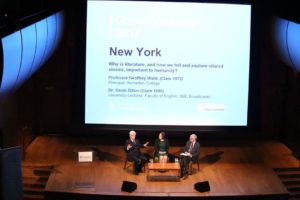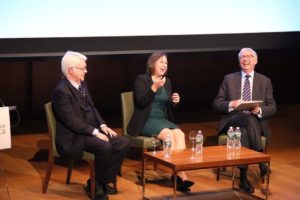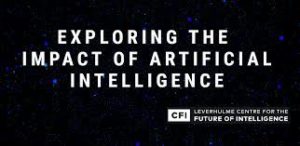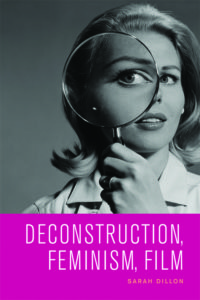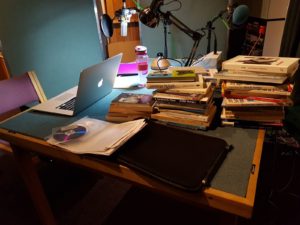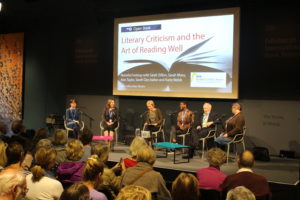 On 23rd August, I had the pleasure of heading back up to Scotland to take part in a live edition of BBC Radio 4’s Open Book on Literary Criticism, broadcast from the Edinburgh Literary Festival. This special edition explored book criticism and reviewing in the twenty-first century, and whether using critical tools can make us better readers (which I obviously think it does!).
On 23rd August, I had the pleasure of heading back up to Scotland to take part in a live edition of BBC Radio 4’s Open Book on Literary Criticism, broadcast from the Edinburgh Literary Festival. This special edition explored book criticism and reviewing in the twenty-first century, and whether using critical tools can make us better readers (which I obviously think it does!).
CogX 2018
 This week I took part in CogX 2018, a vibrant, buzzing, mind-expanding, sector-spanning festival around all things AI. The Leverhulme Centre for the Future of Intelligence AI Narratives Team used it as an opportunity to share our work with a wide audience. I hosted a panel called ‘”Stop the Terminator Chat” – How to Talk about AI And Avoid the Pitchfork Moment’ and we held a public workshop analysing representations of AI in the media, discussing the problems with them, and speculating on how such representation might be improved. I also had the pleasure of chairing another panel, ‘Can AI be Creative?’, which included some poetic, artistic and humorous challenges to the audience, to distinguish between human and artificial creativity. Both panels are available to watch online.
This week I took part in CogX 2018, a vibrant, buzzing, mind-expanding, sector-spanning festival around all things AI. The Leverhulme Centre for the Future of Intelligence AI Narratives Team used it as an opportunity to share our work with a wide audience. I hosted a panel called ‘”Stop the Terminator Chat” – How to Talk about AI And Avoid the Pitchfork Moment’ and we held a public workshop analysing representations of AI in the media, discussing the problems with them, and speculating on how such representation might be improved. I also had the pleasure of chairing another panel, ‘Can AI be Creative?’, which included some poetic, artistic and humorous challenges to the audience, to distinguish between human and artificial creativity. Both panels are available to watch online.
Time Travelling on BBC Radio 3’s Essential Classics
 I have become a time traveller. Not literally, unfortunately, but in name at least, as I join the team of Time Travellers on BBC Radio 3’s Essential Classics. Time Travellers is a fun feature which goes out Monday to Friday at about 10.10am, in which presenters pique listeners’ interest with a quirky slice of cultural history. I’ve told stories about how Dorothy Parker’s ashes ended up at the Baltimore Headquarters of the NAACP, how one of Samuel Beckett’s ghost stories was rejected for being too creepy, and, one of my favourites, how George Bernard Shaw is responsible for Amazon’s Echo being gendered female, even though she doesn’t know why. More stories from me during the course of 2018; in the meantime, go here for some of the best journeys of the Time Travellers team.
I have become a time traveller. Not literally, unfortunately, but in name at least, as I join the team of Time Travellers on BBC Radio 3’s Essential Classics. Time Travellers is a fun feature which goes out Monday to Friday at about 10.10am, in which presenters pique listeners’ interest with a quirky slice of cultural history. I’ve told stories about how Dorothy Parker’s ashes ended up at the Baltimore Headquarters of the NAACP, how one of Samuel Beckett’s ghost stories was rejected for being too creepy, and, one of my favourites, how George Bernard Shaw is responsible for Amazon’s Echo being gendered female, even though she doesn’t know why. More stories from me during the course of 2018; in the meantime, go here for some of the best journeys of the Time Travellers team.
Pursuing the Strange Case of Dr Jekyll and My Hyde
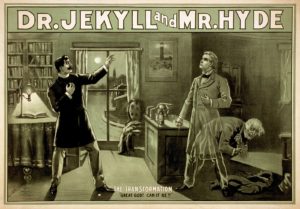 My BBC Radio 3 documentary series, Literary Pursuits, continues this Sunday with a rollicking investigation into the story behind the writing of Robert Louis Stevenson’s classic, Strange Case of Dr Jekyll and Mr Hyde. Recording took us from Edinburgh to Oxford and at one point required retracing Stevenson’s childhood footsteps with the help of SatNav! I taught Jekyll and Hyde for many years when at the University of St Andrews, but I have to say that it was only through making this documentary that I fully came to understand all its many layers. People often ask me what the relationship is between my academic work and my broadcasting – the answer is that it’s a symbiotic one. I couldn’t make the radio programmes that I want to make without my academic expertise, but the influence, effect and benefit is never just in that direction. I always learn so much from my radio work, both in terms of new knowledge acquired, but also in terms of that for some reason “dreaded” thing, transferable skills. Radio is through and through both a collaborative and creative endeavour, and my communication, team work, and written skills are so much stronger for it. They’re all skills that us academics could do with strengthening every so often!
My BBC Radio 3 documentary series, Literary Pursuits, continues this Sunday with a rollicking investigation into the story behind the writing of Robert Louis Stevenson’s classic, Strange Case of Dr Jekyll and Mr Hyde. Recording took us from Edinburgh to Oxford and at one point required retracing Stevenson’s childhood footsteps with the help of SatNav! I taught Jekyll and Hyde for many years when at the University of St Andrews, but I have to say that it was only through making this documentary that I fully came to understand all its many layers. People often ask me what the relationship is between my academic work and my broadcasting – the answer is that it’s a symbiotic one. I couldn’t make the radio programmes that I want to make without my academic expertise, but the influence, effect and benefit is never just in that direction. I always learn so much from my radio work, both in terms of new knowledge acquired, but also in terms of that for some reason “dreaded” thing, transferable skills. Radio is through and through both a collaborative and creative endeavour, and my communication, team work, and written skills are so much stronger for it. They’re all skills that us academics could do with strengthening every so often!
Talking AI Narratives with the Today Programme
The AI Narratives project at the Leverhulme Centre for the Future of Intelligence is one of the most exciting research projects I’ve ever been involved in, combining traditional individual scholarly research (we are all writing monographs connected in some way or other with the project), collaborative outputs (two edited collections and a journal special issue are currently in preparation) as well as significant and genuinely impactful outfacing work, facilitated by our collaboration with the Royal Society. The project website will be updated in the Spring so that we can share information about all the things we are doing more easily, but in the meantime we’re carrying on with our academic research and public engagement in earnest. I marked the end of 2017 with a brief appearance on BBC Radio 4’s Today programme (available here @ 1.53.13) in which I was at pains to counter media sensationalism with a message about the importance of analysing and diversifying popular narratives about AI if the technology is to provide a future we all want, rather than the one some of us fear.
Global Cambridge in New York – Why Literature Matters
Last week I was fortunate enough to enjoy my first visit ever to New York as part of a work trip to take part in Global Cambridge’s New York City Vice-Chancellor Welcome Reception for Cambridge’s new VC, Professor Stephen Toope.
I joined Professor Toope and Professor Geoffrey Ward, Principal of Homerton College, in front of gathered alumni to discuss why literature matters, and the importance and role of storytelling in the contemporary world. It’s a topic that’s crucial to the research and thinking that I am doing at the moment on the AI Narratives project at CFI, as well as to my public advocacy for the value and importance of literature and literary criticism in the twenty-first century. 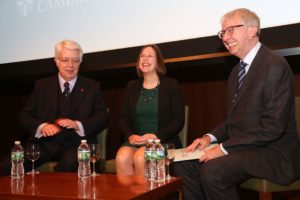
But the importance and seriousness of the topic didn’t prevent us from having a good laugh on occasion as well, as is clear from the photographic evidence!
University of Cambridge Partners with the BBC and First Story for the National Short Story Awards


 Over the past year I have been working hard to broker a partnership between the University of Cambridge, the literary charity First Story, and the BBC on the BBC National Short Story Award, the BBC Young Writers’ Award and the BBC Student Critics’ Award. It is wonderful that today we open the call for submissions for the 2018 awards, the first of the three year partnership, with a fantastic line-up of judges.
Over the past year I have been working hard to broker a partnership between the University of Cambridge, the literary charity First Story, and the BBC on the BBC National Short Story Award, the BBC Young Writers’ Award and the BBC Student Critics’ Award. It is wonderful that today we open the call for submissions for the 2018 awards, the first of the three year partnership, with a fantastic line-up of judges.
Stig Abell and Katie Thistleton will chair the 2018 panels of judges for the BBC National Short Story Award and BBC Young Writers’ Award respectively. Abell and Thistleton will be joined by an esteemed group of award-winning writers and poets on their respective panels. For the BBC National Short Story Award: short story writer and 2016 BBC NSSA winner, K J Orr and Granta’s ‘20 under 40’ novelist, Benjamin Markovits, one of last year’s shortlisted writers, returning judge, Di Speirs, Books Editor at BBC Radio, and multi award winning poet and Cambridge alumni Sarah Howe. For the BBC Young Writers’ Award, Thistleton will lead Carnegie Medal-winning YA author and former teacher, Sarah Crossan, celebrated poet Dean Atta, adult and YA author William Sutcliffe and bestselling author, actress, singer and vlogger, Carrie Hope Fletcher.
The BBC National Short Story Award is one of the most prestigious for a single short story, with the winning author receiving £15,000, and four further shortlisted authors £600 each. The shortlisted writers for the BBC Young Writers’ Award will have their stories featured on the BBC Radio 1, Cambridge University and First Story websites, with the winner’s story broadcast on the radio station. In addition, a new initiative, the BBC Student Critics’ Award with First Story and Cambridge University (SCA), will give selected 16-18 year olds around the UK the opportunity to read, discuss and critique the five shortlisted NSSA stories from Easter 2018.
The charity First Story will support the YWA and BBC SCA with further activity that will engage young people with reading, writing and listening to short stories. The University of Cambridge will support all three awards, including hosting a short story symposium at the Institute of Continuing Education on 7th July 2018, and curating an exclusive online exhibition of artefacts drawn from the University Library’s archive, to inspire and intrigue potential entrants of the YWA.
I am delighted that the University has become involved in a partnership that promises so much in terms of supporting and raising the profile of the short story nationally, as well as encouraging the creative and literary ambitions of Britain’s young adults, and helping Cambridge to reach out across the country, raising aspirations and ambitions.
Full details of the 2018 Awards launch can be found here.
Let the Future Commence…
With Deconstruction, Feminism, Film submitted and with it a number of intellectual questions I’ve been wrestling with for over a decade put to rest, I am now delightedly embracing my research on science fiction, and on science and literature. This work began whilst I was at St Andrews and has been bubbling along over the past three years, but it took a back seat to prioritise finishing the film book. Now it gets to take centre stage! Earlier this month, I joined the Leverhulme Centre for the Future of Intelligence as a Senior Research Fellow and co-Project Lead on the AI Narratives project. I’ll be working alongside co-Project Leads Dr Stephen Cave, Executive Director of CFI, and Claire Craig, Director of Science and Policy at the Royal Society, as well as Kanta Dihal, our postdoctoral researcher and Associate Fellow, Dr Beth Singler. It’s a great team, and an exciting three year project to explore how AI is currently portrayed in literary, cinematic and other cultural narratives, what impact that might be having, and what we can learn from how other complex, novel technologies have been communicated. The Royal Society have also generously funded a more focused reboot of the What Scientists Read research I carried out with a multidisciplinary team in Scotland, so watch this space for updates on the AI Narratives project and on What AI Researchers Read…
New Book Submitted: Deconstruction, Feminism, Film coming in 2018
It’s been a momentous three months since my last post as at the end of September I submitted a book I’ve been thinking about and working on intermittently for over sixteen years. Over the past two years I’ve been able to pull together all that thinking, engage in sustained writing, and produce a book I am truly proud of: Deconstruction, Feminism, Film will be published by Edinburgh University Press in June 2018. It’s a special book to me for many reasons: it’s my first book that extends my work from literary studies into film; it addresses and finally puts to rest troubling philosophic questions about deconstruction that I’ve had since I was a PhD student; and it articulates my methodology as a feminist scholar. Most importantly, however, it is my first monograph since having my children. As any academic parent knows, the effect of having children on one’s career is enormous – it’s not just the actual weeks you take off for parental leave. If you carry the child, it’s the inability to concentrate in the final months of a pregnancy, or even throughout those nine months if one has a difficult pregnancy. It’s the chronic sleep deprivation that arrives with your first child, which, if they are not that mythical beast, ‘a good sleeper’, prevents all but the most basic functioning (and can do so, in my experience, for years). It’s the return to work as a different person, with a different set of commitments and an entirely different relationship to time. It’s all the conferences, invitations, after-hours seminars, international travel that are now mostly ruled out just as a matter of course, with the select few you choose to attend requiring careful and extensive planning. I have no complaints – I chose to have my children, I love them, and they are more important to me than any book. But the pride I feel in having produced Deconstruction, Feminism, Film as well as my babies is enormous. So for any academic parent out there struggling in those early years, doubting the possibility that they will ever read anything more advanced than a picture book again, let alone have the intellectual energy, time and space to WRITE a book again….keep the faith: you will be able to do it again, eventually.
John Berger: Ways of Listening, BBC Radio 3
I’ve just spent a very happy couple of days in Bristol scripting and recording BBC Radio 3’s John Berger: Ways of Listening, a three hour celebration of his life and work to be broadcast on Radio 3 on Sunday 23rd July from 8.30pm. It’s a symphony of delights including conversation with those who knew him well, a broadcast of the 1997 radio dramatisation of To The Wedding (my favourite of his novels), and selections from his best bits on TV and radio. It’s been a pleasure to immerse myself in his work again (and by goodness, is there a lot of it). If you’ve never encountered him before (my Mum hadn’t!), Ways of Seeing is the place to start – all four episodes of this groundbreaking 1972 series are available on YouTube. A shout out here as well, for the unsung heroes of radio – the producers. Tim Dee is putting all this together, a man of wisdom, skill and infinite patience. Go check out his work too.


